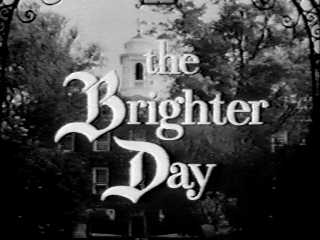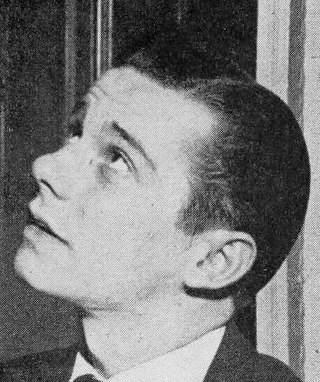Related Research Articles
A soap opera, daytime drama, or soap for short, is typically a long-running radio or television serial, frequently characterized by melodrama, ensemble casts, and sentimentality. The term "soap opera" originated from radio dramas originally being sponsored by soap manufacturers. The term was preceded by "horse opera", a derogatory term for low-budget Westerns.

The Edge of Night is an American mystery crime drama television series and soap opera, created by Irving Vendig and produced by Procter & Gamble Productions.

As the World Turns is an American television soap opera that aired on CBS for 54 years from April 2, 1956, to September 17, 2010. Irna Phillips created As the World Turns as a sister show to her other soap opera Guiding Light. With 13,763 hours of cumulative narrative, As the World Turns has the longest total running time of any television show. In terms of continuous run of production, As the World Turns at 54 years holds the fourth-longest run of any daytime network soap opera on American television, surpassed only by General Hospital, Guiding Light, and Days of Our Lives. As the World Turns was produced for its first 43 years in Manhattan and in Brooklyn from 2000 until 2010.

Search for Tomorrow is an American television soap opera. It began its run on CBS on September 3, 1951, and concluded on NBC, 35 years later, on December 26, 1986.
General Hospital is an American daytime television soap opera. It is listed in Guinness World Records as the longest-running American soap opera in production, and the second in American history after Guiding Light. Concurrently, it is the world's third longest-running scripted drama series in production after British serials The Archers and Coronation Street, as well as the world's second-longest-running televised soap opera still in production. General Hospital premiered on the ABC television network on April 1, 1963. General Hospital is the longest-running serial produced in Hollywood, and the longest-running entertainment program in ABC television history. It holds the record for most Daytime Emmy Awards for Daytime Emmy Award for Outstanding Drama Series, with 14 wins.

Soapnet was an American basic cable network owned by the Disney–ABC Television Group division of The Walt Disney Company.

Ma Perkins is an American radio soap opera that was heard on NBC from 1933 to 1949 and on CBS from 1942 to 1960. It was also broadcast in Canada, and Radio Luxembourg carried it in Europe.

The Brighter Day is an American daytime soap opera which aired on CBS from January 4, 1954, to September 28, 1962. Originally created for NBC Radio by Irna Phillips in 1948, the radio and television versions ran simultaneously from 1954–56. Set in New Hope, Wisconsin, the series revolved around Reverend Richard Dennis and his four children, Althea, Patsy, Babby and Grayling.
The year 1950 saw a number of significant happenings in radio broadcasting history.

The First Hundred Years was the first ongoing TV soap opera in the United States that began as a daytime serial, airing on CBS from December 4, 1950 until June 27, 1952.

Hawkins Falls, Population 6200 is an American television soap opera that was broadcast in the 1950s, live from Chicago. Though it was not the first original (non-radio-derived) soap opera on American TV, it was the first to be successful, running for more than five years.

Jonathan Arthur Goerss, known as Jon Arthur, was an American entertainer. As Big Jon Arthur, he was the host of the Saturday morning children's radio series Big Jon and Sparkie. Sparkie, "the little elf from the land of make-believe, who wants more than anything else in the world to be a real boy,” was actually the recorded voice of Jon Arthur played at a fast speed.
Just Plain Bill was a 1931-1955 15-minute American radio drama program heard on CBS Radio and NBC Radio. It was "a story of people just like people we all know."

Michael Fitzmaurice was a radio actor, best known for his portrayal of Superman.

George Ansbro was a radio announcer for NBC and ABC for six decades, working with soap operas, big bands, quiz shows and other programs.
Pepper Young's Family is a daytime drama series, with various format and title changes during its long run from 1932 to 1959. It was created and written by short story author and playwright Elaine Sterne Carrington.

When a Girl Marries is an American daytime radio drama that was broadcast on three major radio networks from 1939 to 1957. Created by Elaine Sterne Carrington, it was the highest rated soap opera during the mid-1940s.
Kitty Foyle is an American old-time radio and television soap opera originally aired during the 1940s and 1950s that was based on the 1940 film of the same name starring Ginger Rogers. Kitty Foyle was created by soap opera mogul Irna Phillips of Guiding Light fame and produced by daytime radio monarchs Frank and Anne Hummert of Helen Trent recognition. The program originally starred Julie Stevens in the title role of Kitty Foyle on radio. On television, the title role was portrayed by Kathleen Murray.
Edward Frank Hummert, Jr., professionally known as Frank Hummert and sometimes credited as E. Frank Hummert, was an American advertising agent originally but was best known for producing episodes of nearly 100 daytime/primetime radio dramas, soap opera serials, and music programs between the 1930s and the 1950s.

Bob Readick, also known professionally as Bobby Readick, was an American voice and film actor, best known for a run as the voice of "Johnny Dollar" in the CBS radio series Yours Truly, Johnny Dollar in the early 1960s.
References
- ↑ Dunning, John (1998). On the Air: The Encyclopedia of Old-Time Radio (Revised ed.). New York, NY: Oxford University Press. p. 309. ISBN 978-0-19-507678-3.
- 1 2 3 Cox, Jim (2010). Radio Crime Fighters: More Than 300 Programs from the Golden Age. McFarland. p. 126. ISBN 9781476612270 . Retrieved 20 March 2018.
- ↑ Cox, Jim (2009). The A to Z of American Radio Soap Operas. Scarecrow Press. p. 95. ISBN 9780810863491 . Retrieved 20 March 2018.
- ↑ Adams, Magee (January 6, 1950). "ABC Breaks Pattern With Daytime Show Of 'Whodunit' Type". The Cincinnati Enquirer. Ohio, Cincinnati. p. 19 – via Newspapers.com.

- ↑ "Magazines on the air". Sponsor. 5 (4): 70. February 12, 1951. Retrieved 21 March 2018.
- ↑ "Hollywood Roundup" (PDF). Television Digest. 16 (3): 11. January 18, 1960. Retrieved 21 March 2018.
- ↑ "(no headline)" (PDF). Television Age. January 25, 1960. p. 41. Retrieved 21 March 2018.